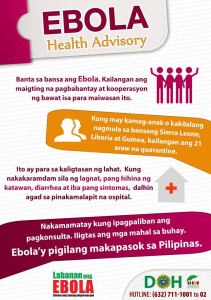Although a full 73 percent of the Philippine population say they are aware of Ebola Virus Disease (EVD), according to a Social Weather Station (SWS) survey, health officials say the need to increase this awareness is necessary.

“Although there is a high percentage of people that have knowledge of Ebola, their knowledge is partial or incomplete. Having correct and sufficient information to enable the appropriate precautions and quell fear is important”, said Presidential Communication Operations Office Secretary Herminio Coloma, Jr., in a radio interview with dzRB Radyo ng Bayan (computer translated).
The survey reveals the extent of their knowledge of Ebola virus, 6% say they have extensive knowledge (“malawak ang kaalaman”) and 23% have adequate knowledge (“sapat ang kaalaman”). Most (44%), however, only have partial or a little knowledge (“bahagyang kaalaman”). Twenty-seven percent have no knowledge (“walang kaalaman”) of Ebola.
82% of Filipinos that are aware of Ebola say they are worried– 49% worried a great deal and 33% somewhat worried – that they or someone in their immediate family might catch it.
The region of the Philippines respondents were from and educational level were factors in the level of knowledge of Ebola. 83% in the National Capital Region (Manila area or NCR) and 77% in Balance Luzon know of Ebola, compared to 68% in Visayas and 65% in Mindanao. Nevertheless, most of those in NCR (48%) and Balance Luzon (50%) who know of Ebola only have partial knowledge of it.
About one-third in Visayas (32%) and Mindanao (35%) have no knowledge of Ebola, compared to 23% in Balance Luzon and 17% in NCR.
Knowledge of Ebola increased with the higher educational attainment of adults: 53% among non-elementary graduates, 62% among elementary graduates, 84% among high school graduates and 93% among college graduates. The more educated the individual is, the more concerned they are about catching Ebola.
Secretary Coloma said, “Ebola preparedness includes tireless teaching and expanding the knowledge of the Ebola Virus. which includes understanding the origin and nature of this disease and how to prevent and treat.”
For more infectious disease news and information, visit and “like” the Infectious Disease News Facebook page

